If you are like many people, it can be difficult to find the energy and time to get in some quality exercise. Family, friends and other priorities often take the forefront of your time, while your fitness routine is stagnant.
Maybe you just hate to sweat in front of a lot of people in a crowded gym.
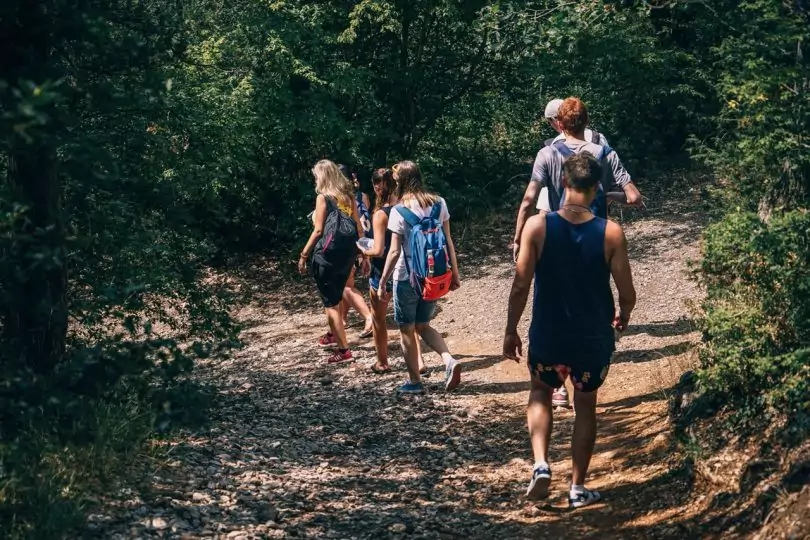
Whatever your reason, hiking is your answer! There are several benefits of hiking, as well as the health benefits of hiking, and we will discuss many aspects of it that will be broken down to body and mind. First, let’s start with the body.
Benefits for the Body
Before you go out on your first hike, there are some tips you should adhere to. Never go out on your first few hikes and expect to be able to make it several hours. You will want to start slowly when you are trying out a hiking routine.
At first, you should try it out for about 10 minutes and then keep adding time to those hikes until you feel ready to knock out a half hour hike, a few days a week. Eventually, you can hike for a couple of hours as exercise and become an avid hiker! You should also consider getting a good pair of boots for hiking, which will increase your ability to get up hills and rough terrain.
Hiking is considered a great cardiovascular workout that will improve many parts of your body such as:
- Bone density improvement: Having dense bones that are high in mass is the best way to be. If you have low bone mass, you are prone to osteoporosis and arthritis and other issues that could lead to fractures and prohibit movement. Bone loss can be measured by getting a bone density scan done. Ways to improve low bone mass are to get exercise like hiking, taken in some vitamin D (or sun!) and eat foods that have a lot of calcium, which is known to help your bones.
- Improved sugar levels as well as blood pressure: Blood sugar levels should be maintained for those with diabetes, as they can get out of control. Most of the time, a regular person’s blood sugar level is anywhere from 100 to 140, depending on when you have last eaten. A diabetic’s sugar levels will vary and need to be monitored by diet and exercise. Blood pressure levels that are systolic should be below 120, with a reading of 140 or more being considered high. Blood pressure is taken by how the heart beats squeeze blood through to your body, which then puts pressure on vessels.
- Lowered risk of heart disease: Heart disease is a term used to describe varying issues with the heart that involve the blood vessels. This can include things like stroke, angina, and heart attack, as well as anything that is wrong with the heart muscles and valves.
- Increased strength in legs, hips, quads and more: Being stronger has always been a positive thing. With hiking you are improving many parts of your body, especially your legs and hips because you are moving through terrain that is full of hills and surfaces that are not flat. Building muscle means your body can handle long walks, lifting heavier objects, and your body is becoming leaner.
- Improved balance and stronger core: Obviously, hiking includes going uphill and enduring harsh terrain. While enduring this, you are helping your body to improve its balance because you are not on a flat surface. Hiking also improves your core, as you are working out many parts of your body at once while moving uphill.
- Weight loss: When you are hiking, your body is going to lose excess fat because you are sweating and exercising. Once you have a hiking routine going, you will notice that you have lost a few pounds, and even gained some muscle mass!
- Decreased anxiety / depression and less stress: Aren’t we all stressed out? Going hiking boosts your mood, so you feel less stressed and maybe more connected to earth. Getting out there and clearing your mind outdoors is a great way to relieve anxiety because you are getting away from the hustle and bustle of life. Plus, any exercise is shown to improve mood, which decreases bouts of depression.
Check out our previous article on how hiking affects weight loss and be amazed.
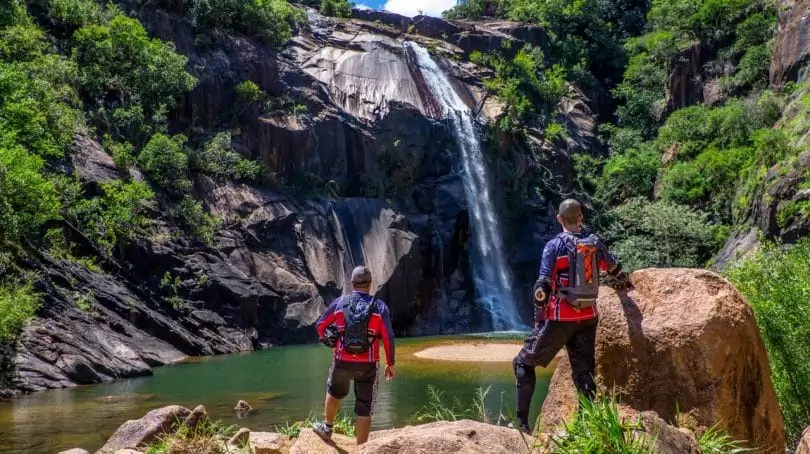
A few more tips
When you go hiking, you are improving your heart, blood vessels and lungs, which improves overall health. You will also gain muscle mass and see a decrease in chances of disease like diabetes, colon cancer, breast cancer, and endometrial cancer.
When you take that hike, just remember you are prolonging your life! If you are hiking with your family, your children also get the same health benefits from hiking, and they will have a better time sleeping, and build strong bones in the process.

Keep in mind that hiking is not just for special camping trips or when you are going out to the country. You can hike near your home, for instance. Just getting in even 20 minutes a few times per week can greatly improve your overall health.
There are apps and other trackers out there that will show your progress and allow you to feel a sense of achievement. Never hike alone, in case of an emergency. Plus, is it not more fun with a friend? You can even read our article on how camping can be an awesome adventure with family, check it out.
While you are outside, going on a wonderful hike, looking at all of the beauty around you, DO NOT forget to bring along water and some other necessities that are needed when you are out in the sun. Also, be sure to drink 2 quarts of water if you are going on a hike that can last upwards of 4 hours. You will lose water while you are exercising and sweating. Here is a list of all the things that are essential:
- Hiking boots or shoes
- Weather appropriate clothing
- Hat and sunglasses for protection from the sun
- Sun screen to keep your skin safe from UV rays
- Snacks
- Phone or Map so you will not get lost
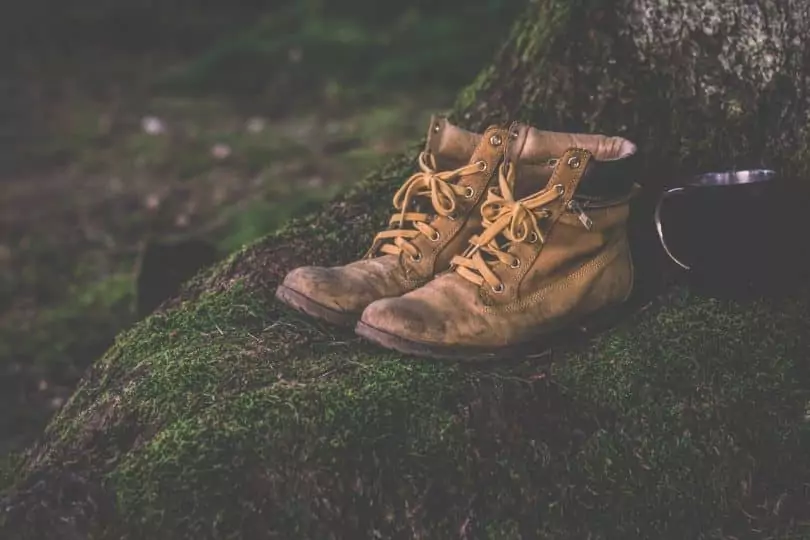
Some beginning hikers may feel a little lost at first, but with a few tips, they will feel like a pro in no time. When making a fitness routine for hiking, you can do things like:
- Try to go up more hills: Even going up a hill with a 10 percent incline can increase your heart rate and burn up to 40 percent more calories!
- Aim for rough terrain: You can work those muscles out by going uphill on uneven terrain, which will improve your balance, too!
- Use weights: If you have a backpack with you, consider using some weights or extra water bottles to give you added weight, up to 10 or 15 pounds, and you will burn extra calories by 10 to 15 percent, along with strengthening your body’s muscles!
- If you find that you have no time for a hike, consider a brisk walk in an area where the terrain is uneven, simulating a true hike. This way, your body will get in a great workout still and your body will not feel rusty.
- Use poles: Using poles while you hike can help reduce wear on your joints. Using poles, helps you to keep moving in a forward momentum, which gives you a better workout with your upper body. This helps to reduce weight faster. They also keep you from falling, and can be adjusted for the type of land you are trekking through.
The health benefits of hiking are enormous, but remember to stay safe while you hike. Take a friend or family member, or a few! Hiking alone is not a good idea, in case of emergency. Take small steps, so you do not slip and injure yourself. Also, before exploring a new area, you should learn the lay of the land before you go there, and always bring a map or GPS. Our review of the Garmin GPS is a must-read, check it out for more tips and tricks.
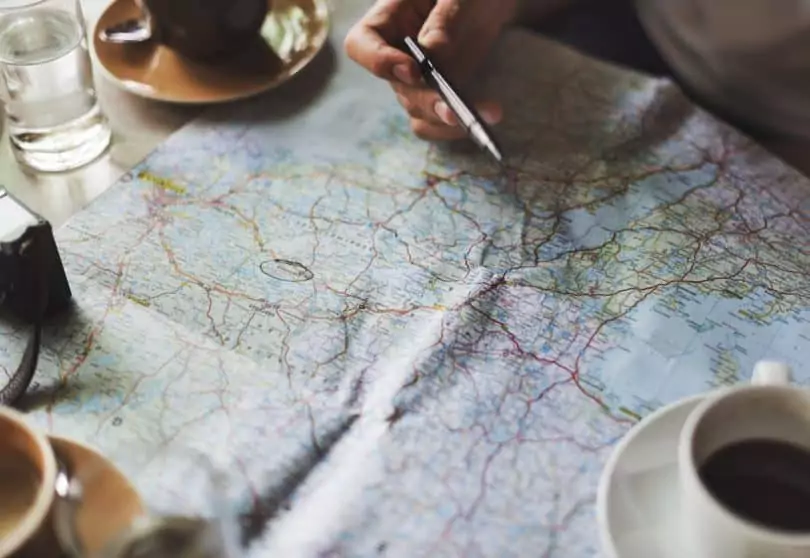
Those were the hiking benefits for your body, now let’s see what health benefits this activity brings for your mind.
Benefits for the Mind
Now that you know how hiking can be beneficial to your health and body, you should know how it will affect your mind and attitude. Imagine going for a hike where the entire landscape is beautiful, serene, and peaceful.
You feel free and your mind seems clear, and in turn, your nerves are more calm, your attitude is more positive, and your mood is boosted all because you are exercising and doing so outdoors with everything beautiful nature provides. Everyday stresses such as work, relationships and the need to be connected with technology can be gone in a heartbeat while you are on a hike.
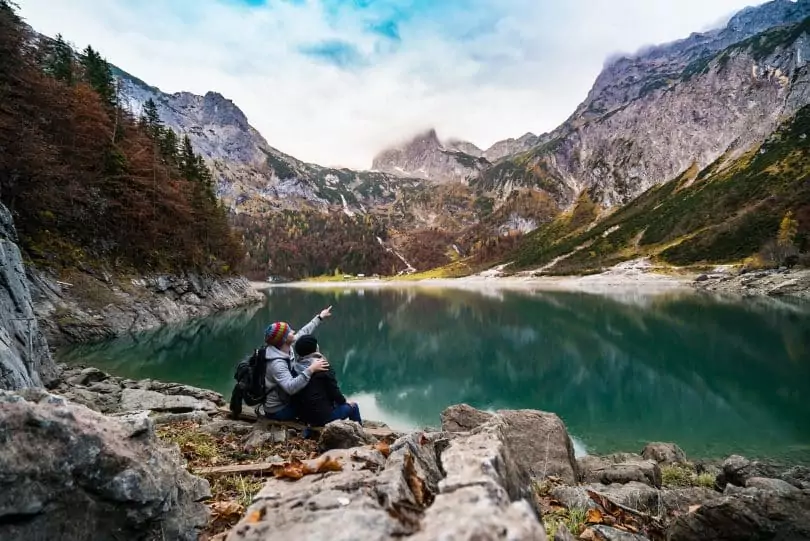
Hiking has been known to be good for mental impairments such as:
Depression: This mood disorder affects many people and can make them feel sad or hopeless. This affects how they think and react, their sleep, ability to work and many factors of their life. Bouts of depression can last weeks or months and can occur for many reasons. Various types of depression exist like postpartum depression, persistent depressive disorder and seasonal depression.
Anxiety: Most people suffer from anxiety from time to time, such as speaking before a large group, or going through a problem. For people who have anxiety disorder, many things can make them nervous from an unexpected visitor to large groups of people. Those that suffer learn that their anxiety gets worse as time goes by and it does not go away, and is very stressful. This may make them reluctant to leave their house or socialize, among other problems.
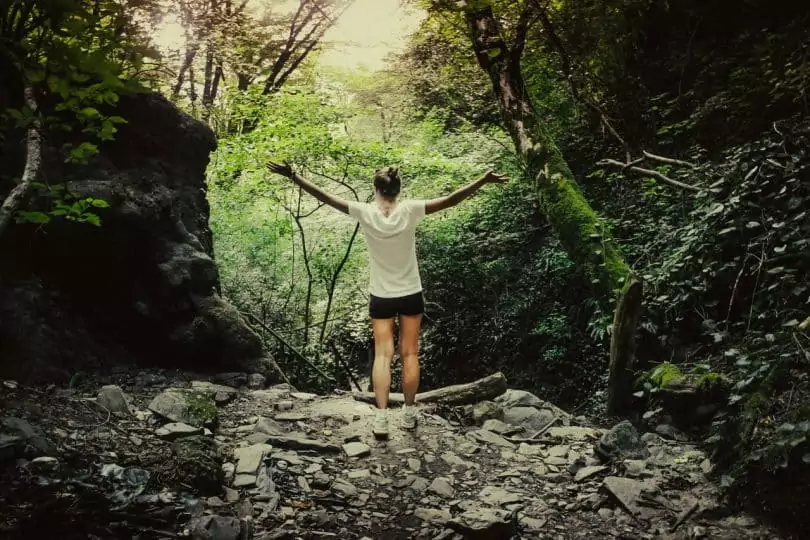
Stress: This is known as stress or pressure one feels from a situation that causes emotional or mental tension on a person. Stress occurs in many forms, from a demanding job, needy or dramatic people, to paying bills. Each day people encounter stress, and hiking is a great way to relieve it and enjoy life. Stress is known to have adverse affects on your health, which is another reason to get outdoors and enjoy the world.
PTSD: Post Traumatic Stress Disorder is a disorder in which a person may develop adverse side effects of an event that occurred. Many service men and women suffer from this after going to war and seeing people killed or killing themselves.
Some people develop this after they have lost someone or been assaulted. Using hiking as a tool can help a person feel less stressed, and lessen the chances or night terrors, flashbacks and more disturbing side effects of this terrible disorder.
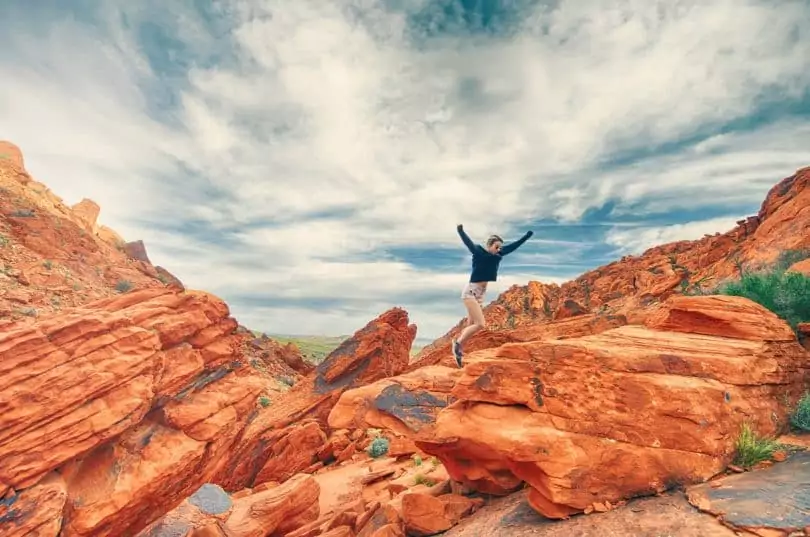
Agoraphobia: This crippling form of anxiety creates the fear that a person is unsafe where they are or in an unsafe situation, when they are actually not. Many of those who suffer feel like this when they are in crowded areas like malls or using a form of public transportation.
Even going outside of the house can seem overwhelming to those who suffer. Hiking can help someone get out of the house, in an area that is not crowded, with beautiful scenery, among people they know. This will decrease the chance of an attack and allow the brain to feel calm.
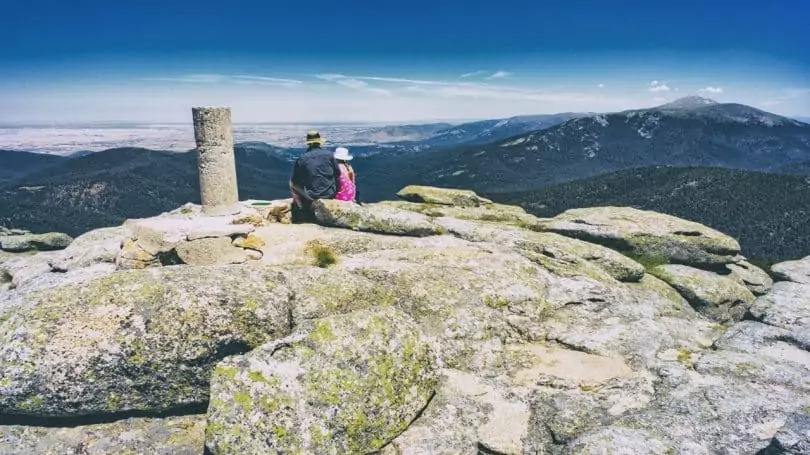
Rumination: This is the act of thinking about negative experiences, which causes negative emotions. A person will constantly think about situations and consequences of experiences, real or not, and what can cause them. This stresses people out and does not allow them to focus on a solution to their problem.
Those that choose hiking to help them, can clear their minds and allow their brain to slow down and enjoy life a little more. Using this with self regulation, which is the act of asking yourself questions to solve the problem, along with other therapeutic models, can reduce the disorder significantly.
Not only does going for a good hike aid in mental impairments, but is is also good in other ways for the brain. Once you begin a hiking routine, you will notice that your attention span has lengthened and you can solve problems easier, as well as finding yourself feeling more creative. Many people find that simply being in nature, away from the hustle and bustle of life and technology, makes them relax, clear their mind and simply think.
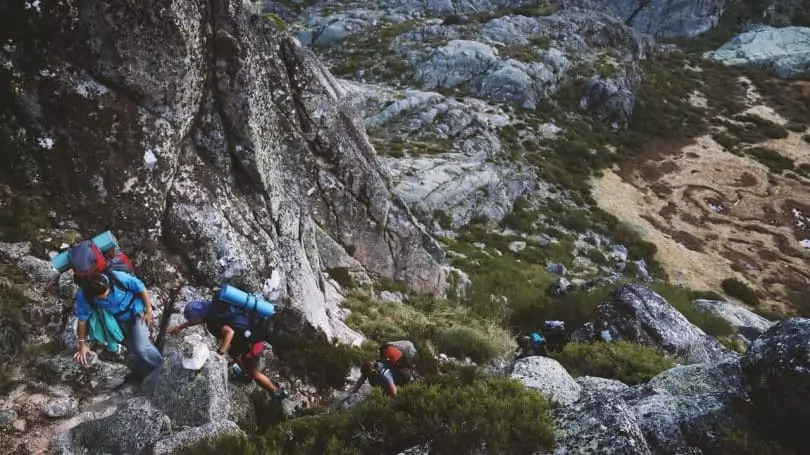
Visiting new places is another exciting perk of hiking. It is fun to find new trails and places to exercise, that are still away from civilization. This will create an exciting feeling within about exploring new territory, and will help the brain form more synopses. Not only that, but you are not going to the same locations, which can create boredom.
After you have new places locally, why not take a vacation somewhere that is known for great trails and adventures outdoors? Finding places that are visually exciting will only increase the chance of a great hike. Going places where you can see mountains, canyons, forests or deserts will surely be beautiful and relaxing!
All in All
As you can see, hiking is a great way to get in some exercise and help renew and refresh your mind. Staying healthy by hiking will reduce your risk of common illness, and is proven to help you live longer and decrease the chances of heart disease, diabetes, and osteoporosis.
Not only is it good for your body, but your peace of mind will grow, while your anxiety and stress decrease! Hiking is a fun way to bond with your family and friends, see beautiful scenery and explore new places! Hiking is a winning activity for everyone!
Are you a newbie in camping? No worries. Click on our article on Hiking 101 for more guidelines and important tips.

Now that you know what good comes out of hiking, we hope that we have gotten you more interested in this great activity, and that you are now encouraged to go on your own adventures in the great outdoors. If you think that we might have missed some additional benefits, feel free to let us know by leaving a comment in the comments section below.

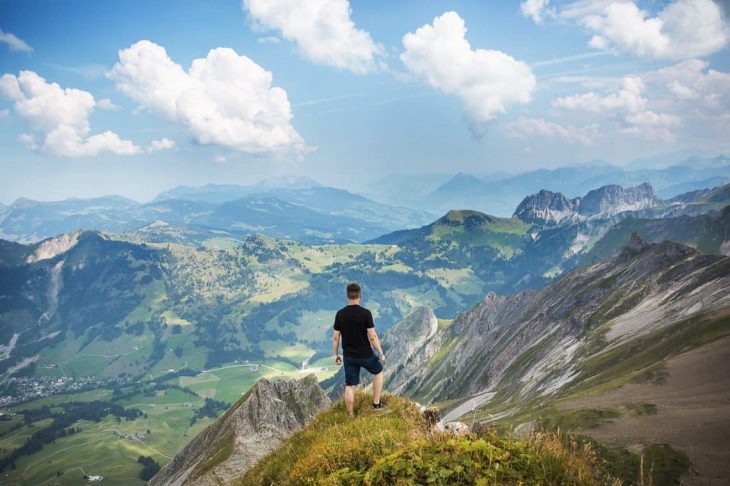






I love hiking anyways, so I don’t need people to exactly convince me to hike. But this will be great for my parents who believe that hiking is tiring and a waste of time. Thanks for the great article! By the way, know any good tips on helping my parents develop more stamina for hiking?
Thanks for the compliment, Zach! Yes, you can get your parents to start walking with you. Let them build up a stamina for it. Take them to the park for a walk so they can see trails and enjoy nature. Then get them to go on a small day hike with you. After that, they should be hooked!
This is a true factor. I used go for a hike or for camping when I feel like I am too stressed with my work. It will help us to have a peaceful mind for a while enjoying. You do not need be a professional. But you just the things that are essential.
You are completely right!